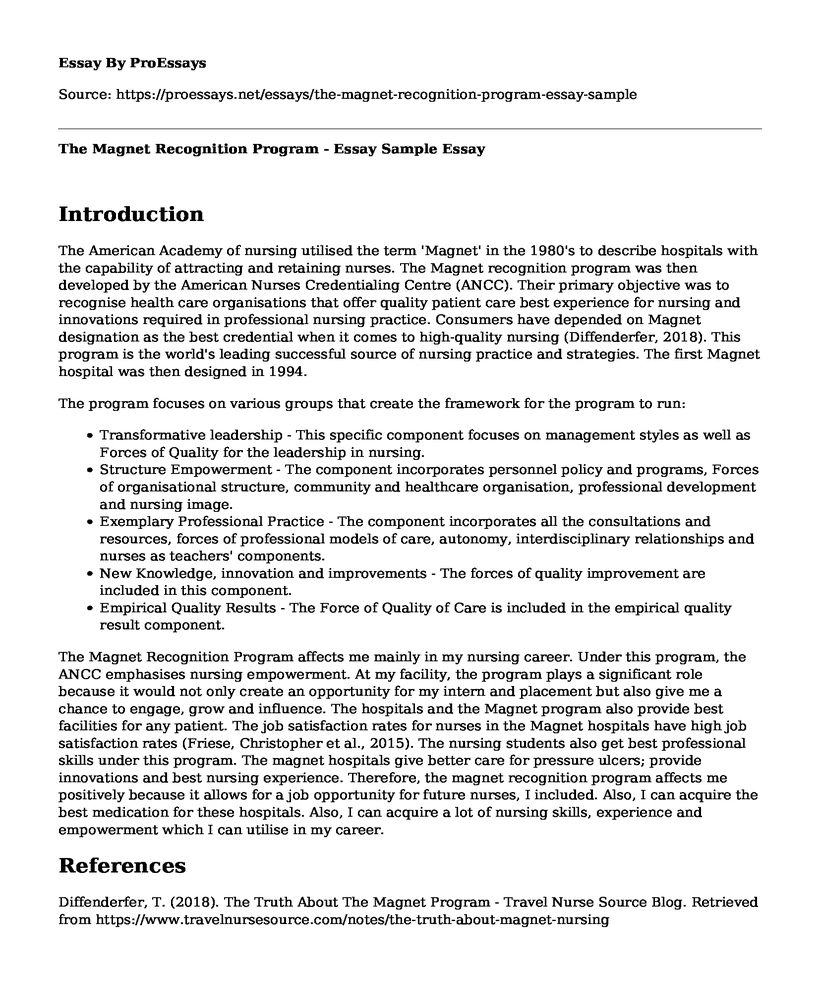Introduction
The American Academy of nursing utilised the term 'Magnet' in the 1980's to describe hospitals with the capability of attracting and retaining nurses. The Magnet recognition program was then developed by the American Nurses Credentialing Centre (ANCC). Their primary objective was to recognise health care organisations that offer quality patient care best experience for nursing and innovations required in professional nursing practice. Consumers have depended on Magnet designation as the best credential when it comes to high-quality nursing (Diffenderfer, 2018). This program is the world's leading successful source of nursing practice and strategies. The first Magnet hospital was then designed in 1994.
The program focuses on various groups that create the framework for the program to run:
- Transformative leadership - This specific component focuses on management styles as well as Forces of Quality for the leadership in nursing.
- Structure Empowerment - The component incorporates personnel policy and programs, Forces of organisational structure, community and healthcare organisation, professional development and nursing image.
- Exemplary Professional Practice - The component incorporates all the consultations and resources, forces of professional models of care, autonomy, interdisciplinary relationships and nurses as teachers' components.
- New Knowledge, innovation and improvements - The forces of quality improvement are included in this component.
- Empirical Quality Results - The Force of Quality of Care is included in the empirical quality result component.
The Magnet Recognition Program affects me mainly in my nursing career. Under this program, the ANCC emphasises nursing empowerment. At my facility, the program plays a significant role because it would not only create an opportunity for my intern and placement but also give me a chance to engage, grow and influence. The hospitals and the Magnet program also provide best facilities for any patient. The job satisfaction rates for nurses in the Magnet hospitals have high job satisfaction rates (Friese, Christopher et al., 2015). The nursing students also get best professional skills under this program. The magnet hospitals give better care for pressure ulcers; provide innovations and best nursing experience. Therefore, the magnet recognition program affects me positively because it allows for a job opportunity for future nurses, I included. Also, I can acquire the best medication for these hospitals. Also, I can acquire a lot of nursing skills, experience and empowerment which I can utilise in my career.
References
Diffenderfer, T. (2018). The Truth About The Magnet Program - Travel Nurse Source Blog. Retrieved from https://www.travelnursesource.com/notes/the-truth-about-magnet-nursing
Friese, C. R., Xia, R., Ghaferi, A., Birkmeyer, J. D., & Banerjee, M. (2015). Hospitals in 'Magnet'program show better patient outcomes on mortality measures compared to non-'Magnet'hospitals. Health Affairs, 34(6), 986-992.
Cite this page
The Magnet Recognition Program - Essay Sample. (2022, Jul 25). Retrieved from https://proessays.net/essays/the-magnet-recognition-program-essay-sample
If you are the original author of this essay and no longer wish to have it published on the ProEssays website, please click below to request its removal:
- Psychotropic Medication for Kids Essay
- Essay Sample on Monitoring the Quality of Healthcare
- How Ethics Relates to Vaccinations? - Informative Essay
- Essay on Nurses Helping Patients With Religious Beliefs
- Essay Example on Unveiling Public Health: Exploring the Role of Epidemiology
- SARS: Deadly Respiratory Infection Spread by Humans - Research Paper
- My Journey to Self-Realization - Essay Sample







